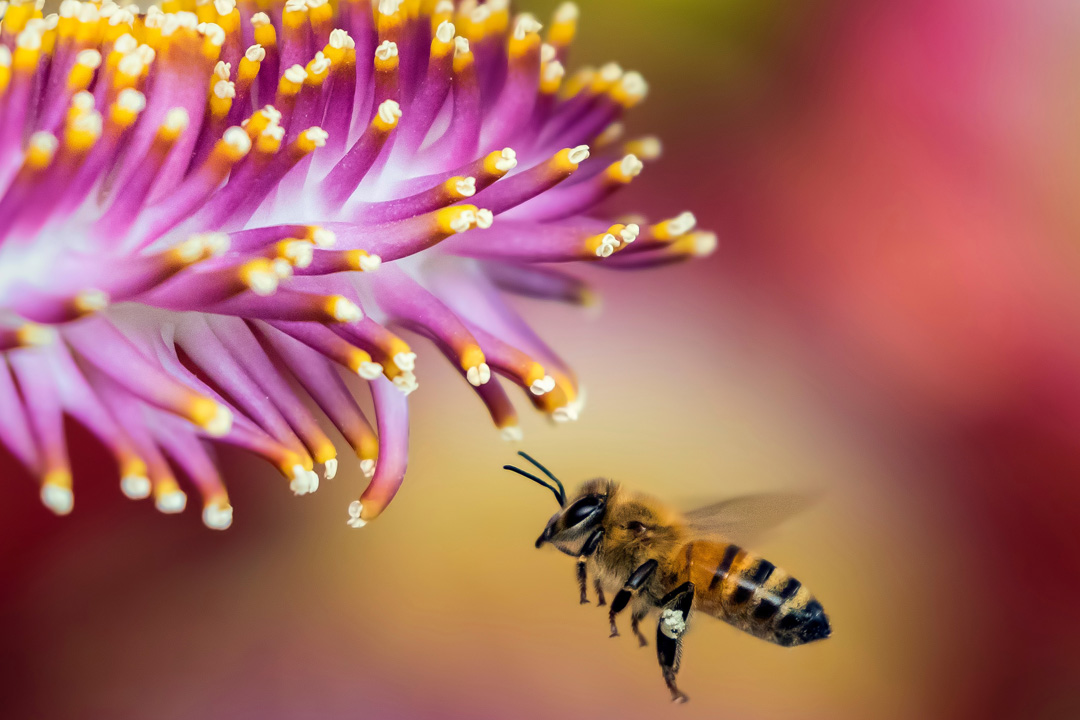
Reducing Food Waste in Foodservice
October 16, 2018 by Doreen Garelick, Dietetic Intern
Our intern Doreen attended a food waste summit for restaurants and compiled these tips to help food service operators redirect…
January 3, 2017

To many of us, the honeybee is a mysterious creature. For years I have heard rumblings of the importance of honeybees, that they’ve died in large numbers inexplicably, that they may experience human like-emotions, that they are fiercely protective of their queen. Aside from producing honey, however, I’m not sure that I could tell you exactly why honeybees are so important.
Fortunately, online resources dedicated to the illustrious honeybee are abundant and a deep dive into this online world has taught me that honeybees are nature’s greatest pollinators. That is: they are responsible for transferring pollen between the male germ cell of a plant and the female reproductive system of seed plants. The importance of this process cannot be overstated and without pollination, plants would be unable to reproduce and the crops we depend on would be unable to yield food.
As I set out to discover more, I was shocked to learn that honeybees and their continued safety is so important to this country’s ecosystem that the White House established a Pollinator Task Force. This task force put together a 2015 report “National Strategy to Promote the Health of Honeybees and Other Pollinators” which found that pollinators, most often honeybees, are responsible for one in every three bites of food we take, and increase our nation’s crop values each year by more than 15 billion dollars. Not only is this a staggering amount, but it only takes into account the current bee environment in this country. Worldwide the numbers are sure to be far greater.
Unfortunately, a closer look reveals that bees are struggling. According to a USDA survey released in May 2016, there were 2.59 million or 8% fewer honeybee colonies on January 1, 2016 than the 2.82 million present a year earlier on January 1, 2015 for operations with five or more colonies. It seems that there are many theories behind this: increasing pesticide use, loss of habitat, disease, and the puzzling colony collapse disorder are all possible contributors.
Although government funds are going toward protecting pollinators, and just recently the Obama administration and the Fish and Wildlife Service have added another bee to the endangered species list, I’m left wondering what can I do (in my small NYC apartment) to aid in the plight of the honeybee. It turns out, I’m not the only person with this question and small companies are popping up nationwide. Organizations such as Best Bees deliver, install, and manage beehives for residences and businesses throughout New England, New York City, Washington, D.C., Los Angeles, Chicago, Denver, Seattle, and San Francisco, with profits going to fund research to improve bee health (be sure to check local regulations...in NYC you must register your hive). Although my honeybees won’t be responsible for pollinating cash crops, I can contribute to improving the health and safety of bees by supporting small business in their research endeavors – and gaining a beehive in the process!

October 16, 2018 by Doreen Garelick, Dietetic Intern
Our intern Doreen attended a food waste summit for restaurants and compiled these tips to help food service operators redirect food waste from landfills.
Nutrition 101

Nutrition 101
September 26, 2018 by Doreen Garelick, Dietetic Intern
Ever notice headlines about rapid weightloss? Dietetic Intern Doreen Garelick looks deeper into a recent eye-catching headline to see if there's any truth behind it.
Connect
 Follow us on Twitter
Follow us on Twitter Friend us on Facebook
Friend us on Facebook Follow us on Pinterest
Follow us on Pinterest Follow us on Instagram
Follow us on Instagram Read our Blog
Read our Blog Watch videos on YouTube
Watch videos on YouTube Watch videos on Vimeo
Watch videos on Vimeo Connect with us on Linkedin
Connect with us on Linkedin Find us on Foursquare
Find us on Foursquare
Tweets by @SPEcertifiedBlog Search
Categories
SPE Certified Newsletter
Sign up for news on the latest SPE-certified venues, events and SPE updates.
We will never share your personal information with a third party.